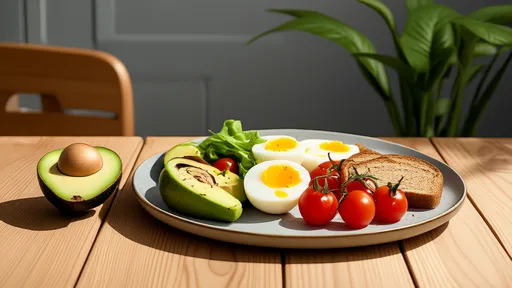The morning sun peeks through the kitchen window as the aroma of freshly prepared vegetarian breakfast fills the air. In recent years, plant-based morning meals have transitioned from niche dietary preference to mainstream culinary movement. What was once considered an ascetic choice has blossomed into a vibrant celebration of flavors, textures, and nutritional benefits that can rival any traditional breakfast spread.
The Evolution of Morning Nutrition
Breakfast tables across the globe are witnessing a quiet revolution. The stereotypical image of bacon sizzling alongside eggs is being challenged by colorful arrays of plant-based alternatives that don't compromise on satisfaction. This shift isn't merely about removing animal products - it's about rediscovering the incredible diversity of ingredients that nature provides at dawn's first light.
Modern vegetarian breakfasts have shattered the myth that morning meals require animal protein to be substantial. From protein-packed chia puddings to savory tofu scrambles that mimic the mouthfeel of scrambled eggs, contemporary plant-based cooking techniques have achieved remarkable feats of culinary alchemy. The result is breakfast options that satisfy both the palate and nutritional requirements without relying on meat or dairy.
Global Inspirations for Morning Meals
Travel the world through vegetarian breakfast traditions and you'll discover an astonishing variety. In South India, steaming idlis (fermented rice cakes) served with coconut chutney and sambar provide a complete protein through the combination of rice and lentils. The Middle Eastern breakfast spread might feature ful medames - slow-cooked fava beans seasoned with cumin, lemon, and olive oil, served with warm pita. Mexican mornings come alive with chilaquiles made from crispy tortilla chips bathed in salsa verde or roja, topped with creamy avocado and queso fresco (easily made vegan with plant-based cheese alternatives).
These global traditions demonstrate how vegetarian breakfasts have been nourishing cultures for centuries. What's revolutionary today is how these diverse culinary threads are being woven together in creative new combinations. A Tokyo-inspired breakfast bowl might feature miso-glazed eggplant alongside tamagoyaki (Japanese omelet) made with chickpea flour, while a California-style smoothie bowl bursts with tropical fruits, granola, and nut butters.
The Science Behind Plant-Based Mornings
Nutritional research continues to reveal advantages to starting the day with plant-powered meals. Vegetarian breakfasts tend to be higher in fiber, which promotes satiety and stable blood sugar levels throughout the morning. The phytonutrients found in colorful fruits and vegetables provide antioxidants that help combat oxidative stress. Many plant-based breakfast staples like oats, nuts, and seeds offer healthy fats that support cognitive function - particularly valuable for morning mental clarity.
What's often overlooked is how vegetarian breakfasts naturally incorporate a wider variety of food groups. A typical Western breakfast might revolve around just two or three ingredients (eggs, toast, bacon), while a well-composed plant-based meal could easily include five to seven different plants - each contributing unique nutritional benefits. This diversity translates to a broader spectrum of vitamins, minerals, and beneficial plant compounds consumed before noon.
Breaking the Fast with Plants
The concept of "breaking the fast" takes on new meaning with vegetarian options. After hours of sleep, the body benefits from easily digestible nourishment that doesn't overwhelm the digestive system. Plant-based meals tend to be lighter yet still energizing, avoiding the heavy lethargy that sometimes follows greasy breakfast meats. This makes vegetarian breakfasts particularly appealing for those with sensitive stomachs or anyone seeking sustained morning energy without spikes and crashes.
Contemporary vegetarian breakfasts also excel at customization for different dietary needs. Gluten-free? Try buckwheat pancakes or quinoa breakfast bowls. Avoiding soy? Lentil-based scrambles provide ample protein. Nut allergies? Sunflower seed butter makes excellent toast topping. This adaptability makes plant-based morning meals inclusive for various health requirements and preferences.
Culinary Creativity Without Limits
Perhaps the most exciting aspect of modern vegetarian breakfasts is their boundless creativity. Chefs and home cooks alike are pushing boundaries with innovative preparations. Jackfruit takes center stage as a convincing stand-in for pulled pork in breakfast tacos. Aquafaba (chickpea brine) whips up into fluffy vegan pancakes. Nutritional yeast adds cheesy flavor to dairy-free omelets. The toolkit for plant-based breakfast creation grows more sophisticated each year.
This innovation extends to presentation as well. Vegetarian breakfasts often become edible works of art - vibrant smoothie bowls arranged like painter's palettes, avocado toast garnished with edible flowers, chia puddings layered like parfaits in glass jars. The visual appeal enhances the dining experience, proving that abstaining from animal products doesn't mean sacrificing beauty or indulgence.
The Environmental Morning Advantage
Choosing plant-based breakfasts carries environmental benefits that accumulate with each morning meal. Animal agriculture requires significantly more water, land, and energy than plant food production. By opting for vegetarian breakfasts, individuals reduce their carbon footprint before the day properly begins. When multiplied across communities and nations, these morning choices collectively impact resource conservation and climate change mitigation.
The sustainability argument becomes particularly compelling when considering breakfast staples. Producing a pound of beef requires about 1,800 gallons of water, while a pound of oats needs just 290 gallons. Almond milk production uses about 80% less water than dairy milk. These environmental savings happen automatically with each plant-based breakfast selection, making morning meals an accessible entry point for eco-conscious eating.
Economic Considerations
Contrary to popular belief, vegetarian breakfasts can be remarkably budget-friendly. Staples like oats, bananas, peanut butter, and seasonal fruits offer nutritional density at low cost. Eggs and meat often represent the most expensive components of traditional breakfasts, while plant-based proteins like lentils and beans provide affordable alternatives. Even specialty items like plant-based meats have become more accessible as production scales increase and competition grows in the marketplace.
The economic benefits extend beyond grocery bills. Numerous studies link plant-based diets with reduced risk of chronic diseases, potentially lowering long-term healthcare costs. While no single breakfast choice determines health outcomes, consistently choosing nutrient-dense vegetarian options contributes to overall wellbeing in ways that may prove financially prudent over time.
Cultural Shifts and Morning Rituals
The rise of vegetarian breakfasts reflects broader cultural transformations. As mindfulness about food sources grows, many consumers prefer starting their day in alignment with their values. The morning meal becomes not just about sustenance, but about expressing personal ethics regarding animal welfare, environmental stewardship, and health consciousness. This represents a significant evolution from breakfast as mere habit to breakfast as intentional practice.
Social media has accelerated this shift, with platforms like Instagram showcasing stunning vegetarian breakfast creations that inspire experimentation. What was once considered alternative has gained social currency, with plant-based breakfast spots becoming destinations in their own right. The hashtag #vegetarianbreakfast yields millions of posts, creating virtual communities around morning meal innovation.
Practical Tips for Transition
For those new to vegetarian breakfasts, the transition can feel daunting. Start by plant-ifying familiar favorites: try avocado instead of butter on toast, or mushrooms and spinach in place of sausage. Gradually introduce new ingredients like tempeh or nutritional yeast in small quantities. Batch cooking breakfast items like oatmeal or breakfast burritos ensures convenient options on busy mornings.
Investing in a few key tools expands possibilities. A high-speed blender unlocks creamy smoothies and nut butters. A good non-stick pan perfects vegetable-based omelets. Mason jars simplify overnight oat preparation. With basic equipment and willingness to experiment, anyone can cultivate a satisfying vegetarian breakfast routine.
The vegetarian breakfast revolution proves that morning meals need no longer be bound by tradition or convention. As culinary innovation meets nutritional science and environmental awareness, our breakfast tables become canvases for creativity, wellness, and sustainability - one plant-powered bite at a time.

By /Aug 15, 2025

By /Aug 15, 2025

By /Aug 15, 2025

By /Aug 15, 2025

By /Aug 15, 2025

By /Aug 15, 2025

By /Aug 15, 2025

By /Aug 15, 2025

By /Aug 15, 2025

By /Aug 15, 2025

By /Aug 15, 2025

By /Aug 15, 2025

By /Aug 15, 2025

By /Aug 15, 2025

By /Aug 15, 2025

By /Aug 15, 2025

By /Aug 15, 2025

By /Aug 15, 2025

By /Aug 15, 2025

By /Aug 15, 2025